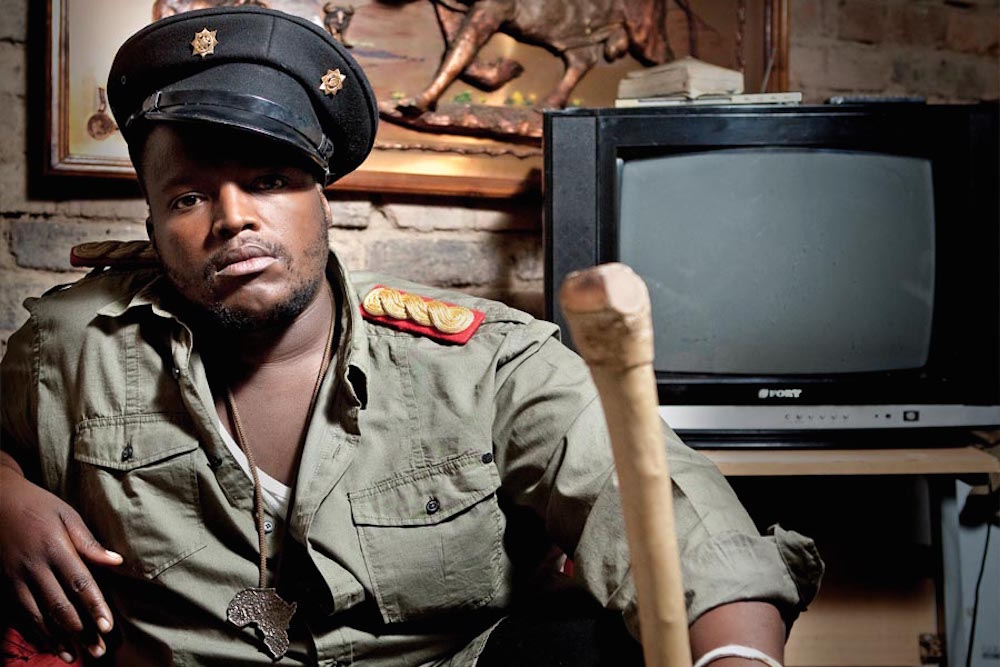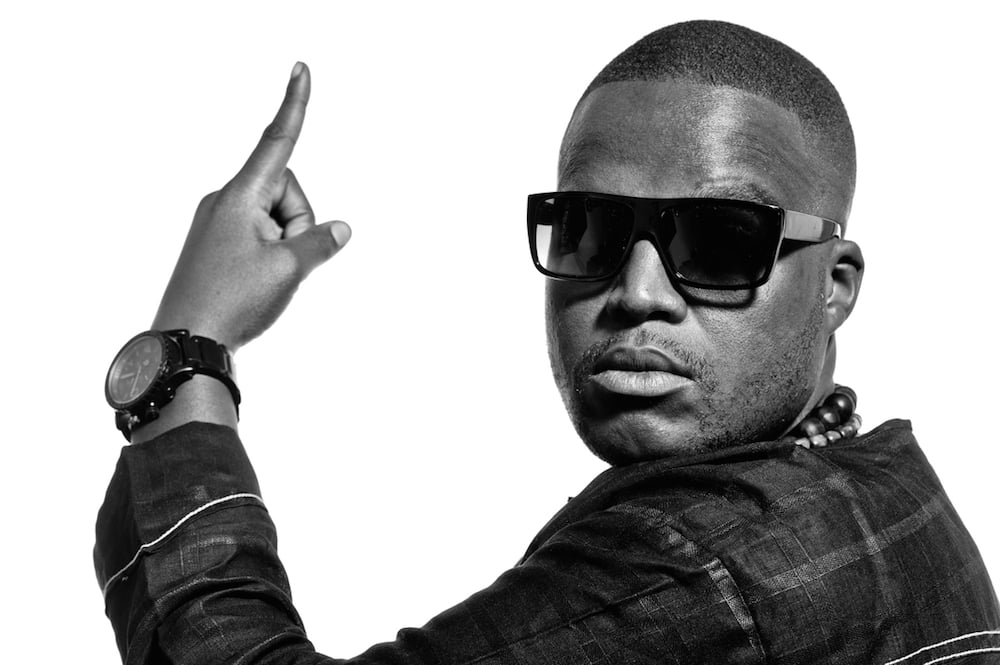With a career that stretches over 15 years
“Art reaches places politics can’t,” says award-winning musician Hip Hop Pantsula (aka HHP, and born Jabulani Tsambo). He is speaking a week after xenophobic attacks resurfaced in the country in April, resulting in deaths and vast displacement.
As one the founders of Motswako rap – a popular hip hop subgenre in South Africa – he’s responding to my question about how artists can react appropriately to tragedies such as the attacks, as a way of creating positive reinforcement and education. Artists “need to interpret what is happening currently in the world and present it back to the ears and eyes that listen or watch them,” he says, adding that “art has the ability to penetrate even through the smallest of cracks”.
Despite implying that art and politics can be separated, over his 15-year career, the rapper has included socially and politically conscious lyrics to his songs and has even taken a vocal stand against injustices. Recently, Jabba – the mononym he often goes by – used his celebrity status to speak out against the attacks while hosting the Samas in April and on other platforms such as TV and social media.
Following the large-scale xenophobic attacks in 2008, HHP has over the years participated in initiatives to promote the idea of a united Africa. His pan-African outlook resulted in the Daraja Walk to east Africa in 2013, designed to bridge African youth across the continent. “The walk is not so much about the action of walking but the action of meeting people, interacting, and just spreading the message of the importance of Africa having its own industry and its own identity in the world,” he told OkayAfrica in 2013. About his activism, the artist says, “Hopefully one day I can be recognised for using my music and art to forge unity among a war-torn Africa. For trying to build a bridge over troubled borders.”
Ahead of the first Lifaqane-Mfecane Festival in Lesotho, which will feature artists such as Thandiswa Mazwai, Phuzekhemisi and Tsepo Tshola, we catch up with the Tswaka star.

You recently took to the Expresso Morning Show with an acoustic anti-xenophobic song. What are your thoughts on the recent spate of attacks across South Africa?
It’s very sad. Part of the reasons why these attacks are happening is that we don’t know any better. We don’t know the true history of the origins of many of our ethnic groups here at home; and half of our families are made up of foreigners who adopted local surnames to acculturate.
The recent attacks were reported to have been sparked by His Excellency King Zwelithini, and that baffles me because I know of the Ngoni people in Chipata, Zambia, who are of Zulu descent. It’s even been reported that our president, Jacob Zuma, has gone to Chipata to attend traditional Ngoni festivals. [“The Ngoni people are related to the Zulu but fled modern-day KwaZulu-Natal to settle in Zambia, Malawi and Tanzania as part of the migration triggered by King Shaka’s wars of conquest in the early 19th century. ” – source] These attacks have been an unfortunate eye opener. Our history needs to be rewritten, including the true history of Bechuanaland, Zimbabwe and the origins of the Nguni people.
What has been some responses to these attacks that has stood out for you?
On the recent Daraja Walk to Kenya, I had a conversation with a local while in Tanzania who told me how they were raised on South African history at school. He also shared how the political landscape of South Africa, in his own opinion, was a ripple effect of apartheid. He went on to explain that he thought apartheid isolated South Africans from the entire continent and made them think life rotated only around them. I can almost pick out some truth in that. South Africa is/ was so developed that many felt like we were a first world country in a third world continent. This was happening while other countries like Ghana, Mozambique, Zimbabwe, Ethiopia, Botswana and many others were helping to liberate us.
What do you think are responsible reactions from high profile personalities to issues like xenophobia?
Artists – whether actors, singers, musicians, fashion designers, dancers, painters et cetera – are social commentators because of the power of expression they possess. They need to interpret what is happening currently in the world and present it back to the ears and eyes that listen or watch them. Art has the ability to penetrate even through the smallest of cracks. Art reaches places politics can’t.
Musicians like Kelly Khumalo and Brickz have had their international shows cancelled in protest against the situation in South Africa, while there have been alleged threats made to musicians like Cassper Nyovest, ahead of performances around the continent. How do you feel about travelling and performing outside of South Africa, like in Lesotho next month?
I’ve always expressed my love for my continent. Being a descendant of a foreigner – my great grandfather James Tsambo – who walked from Mozambique back in 1887, I’ve fully embraced my “African-ness”. If some countries don’t want me in their country being a South African citizen, I’ll understand but I haven’t had an issue yet. I’m also preparing for a show in Tanzania end of May.

On a lighter note, you recently hosted the Samas to much criticism. Can you tell us about your experience hosting?
I enjoyed myself. Learned a lot about what I am and am not capable of. I’ve always thrived in criticism. My whole music career was cast on criticism and still I stand. I’m totally loving the honest criticism I’m getting. Its constructive and I will learn from my mistakes. But others who are just being nasty, I’m brushing it off or taking jabs at them too. I do love me a hater early in the morning before breakfast.
What changes would you make to better the show?
The sound quality at the last few awards has been shocking on TV. For an event that’s the biggest music do in the country, they could beef that side of the production. The vibe at the venue was nice but if it does not comes across on TV, then it’s pointless. Besides that, I really think every year they’ve been improving.
On to your music: it’s been 15 years since the release of your first album “Introduction”. You’ve come a long way. If you could advise a younger HHP on the ins and outs of the industry, what would you say to him?
I’d tell him to play with a live band sooner. Live music is the truth. I’d also tell him to stop impressing people and just do what he loves straight from the get go. My first two albums were dictated [to by a record label] and that wasn’t what I was about. It was when we went independent with my album O Mang? [in 2003] that I started really exploring my world. Regarding O Mang?, I started owning my masters and had creative control over it. Had I done that sooner, with my previous records, I could be far. But all things good or bad happen for the good of your growth.
After having accomplished so much in your years on the SA music scene, is there anything else on your bucket list?
I must get a Nobel Peace nod. Hopefully one day I can be recognised for using my music and art to forge unity among a war-torn Africa. For trying to build a bridge over troubled borders. I’m also going to keep going until I perform on a Saturday Night Live stage. Also, I need to write a book, starting with children’s books.
What can audiences look forward to at your performance at the Lifaqane-Mfecane Music Festival in Lesotho?
The same old Jabba: #MrSurprise. Lesotho is one of the best places to perform with a live band. They treat artists with respect and they never compromised when it comes to sound.
Ancestral Collective presents the first Lifaqane-Mfecane Music Festival at Thaba-Bosiu, in Maseru, Lesotho, on Saturday May 2 (from 2pm to 10pm). For more info, visit the site or Facebook.
Giveaway
The M&G Friday and Ancestral Collective are giving away two double tickets to the Lifaqane-Mfecane Music Festival on Saturday, May 2, at Thaba-Bosiu, in Maseru, Lesotho.
To win, like M&G Friday’s Facebook page (if you haven’t already) and share this post on Facebook.
*Tickets are only for entry into Lifaqane-Mfecane Music Festival and do not cover accommodation, meals and transportation.